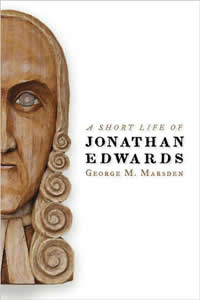Book Notes
 George Marsden, A Short Life of Jonathan Edwards (Grand Rapids: Eerdmans, 2008), 152pp.
George Marsden, A Short Life of Jonathan Edwards (Grand Rapids: Eerdmans, 2008), 152pp.
Those Americans who have heard of Jonathan Edwards (1703–1758) often remember him for his sermon "Sinners in the Hands of an Angry God." All sorts of historical caricatures have been propagated based upon that single sermon. In this abbreviated biography, George Marsden, professor emeritus of history at the University of Notre Dame, gives readers "the most essential and most engaging" aspects of the real Edwards. Marsden is acknowledged as the premier historian of Edwards in the world today; his full length biography called Jonathan Edwards: A Life (Yale, 2003) won at least nine book awards.
Edwards epitomized the Puritan heritage of his pre-Revolutionary day, a time when clergy were the best educated and most influential citizens. Whereas the Puritans were a beleaguered minority in England, they were the first and largest group to settle New England, and so enjoyed a sort of cultural monopoly. Edwards was the only boy in a family with ten sisters. He entered what became Yale College at the age of thirteen, and after a stint in New York City, in 1726 he moved to a church in Northampton, Massachusetts. Northampton was a town of 1,000 people about 100 miles west of Boston. For the next twenty-two years he cared for his flock, welcomed George Whitefield and became a leading advocate (and historian) of the "Great Awakening" revivals, fathered ten children with his wife Sarah, and wrote some of the most important works in American religious history — eg, A Faithful Narrative of the Surprising Work of God and Treatise on Religious Affections. Late in 1748 Edwards was ousted from the church for his more restrictive views on church membership and the sacraments. After a short time as a missionary to Indians in Stockbridge, Edwards was appointed president of Princeton in January of 1758, only to die of a smallpox inoculation eight weeks later at the age of 54.
Jonathan Edwards was "a passionate visionary, a world-class intellectual, and an intense ascetic who lived in a very real world of a large energetic family and a volatile and often contentious village." In his final chapter Marsden suggests what we might learn from Edwards. He concludes that, most of all, Edwards was a man of "God-centered integrity" and "remarkable consistency of his life and thought." Edwards combined intellectual rigor, pastoral care, and spiritual passion all for the glory of his God.


